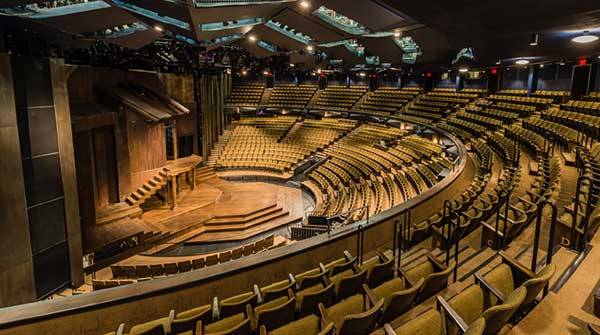From humble origins to global acclaim: the Stratford Festival
 The Stratford Festival of Canada turned 70 this year. This small city of 33,232 residents (according to the 2021 census) has attracted visitors from Canada, the U.S., Britain and other parts of the world to watch William Shakespeare’s plays and modern productions.
The Stratford Festival of Canada turned 70 this year. This small city of 33,232 residents (according to the 2021 census) has attracted visitors from Canada, the U.S., Britain and other parts of the world to watch William Shakespeare’s plays and modern productions.
It’s a remarkable achievement for one of Canada’s first arts festivals, considering its rather humble beginnings.
Tom Patterson founded the Stratford Shakespearean Festival in 1953. A Second World War veteran and local journalist who wrote for Maclean’s, he had no previous experience in the theatre industry. Yet, he convinced British theatre director Tyrone Guthrie to help launch his ambitious project – and acquired a small loan from city council to invite British actor Sir Alec Guinness and American actress Irene Worth to star in its first major Shakespearean production, Richard III.
 The Stratford Festival Theatre |
| Related Stories |
| Stratford offers cultural and culinary feasts
|
| Will Hamilton lead to a renewed interest in American history?
|
| Christmas pantomime a charming holiday tradition
|
This was after Patterson had asked for $100 to go to New York to meet with another great British actor, Sir Laurence Olivier. They gave him $125. He didn’t get to meet Olivier, but the city never lost faith in his vision.
That’s fortunate, considering how difficult Stratford’s first season apparently was.
Guinness, one of the world’s finest stage and screen actors, spoke about it when he appeared at Britain’s Chichester Festival. “‘It was a miracle it ever happened,” he told the Toronto Star in June 1968. “We rehearsed in a dreadful tin-roofed hall. Every bird in the world flew in and twittered, every raindrop which fell crashed loudly on the roof. That the production and the theatre were ever ready was due largely to an act of faith.”
Be it a miracle, act of faith or sturdier-than-expected roof, Stratford quickly became self-sufficient and a great success.
The giant canvas tent where Richard III was performed remained until 1956. The Festival Theatre replaced it, designed by architect Robert Fairfield. “It took 150 construction workers to complete the building by June 30, 1957,” Cindy J. Sinko of the Stratford-Perth Archives wrote in a May 27, 2022 op-ed for the Stratford Beacon Herald, and “they had a dedication ceremony that same day and, on July 1, opened their fifth season.” The theatre had seating for over 1,800 people, including a balcony. Fairfield won a Massey Gold Medal for Architecture the following year. Yet, Sinko pointed out that people “still treasure this reminder of the Stratford Festival’s early years under the tent.”
I wasn’t alive when the tent stood where the theatre currently stands. Having been to the Festival Theatre, I can certainly attest to its magnificent design and presence. It’s an intimate Greek-style amphitheatre in the heart of a small Ontario city. An experience well worth the price of admission.
In fact, I was just there for the first time since COVID-19.
I went to see Much Ado About Nothing on July 20. I rarely get to play hooky during the week – and the first time I’ve ever gone alone to a play. My wife and I had fully intended to head out while our son was away at camp. Nothing quite worked out in terms of performances and times, so I opted to do it on my own.
I was also fortunate enough to be sitting entirely on my own in a fairly packed theatre. Luck was truly on my side that day!
Much Ado About Nothing was superbly done. It’s a brilliant Shakespearean comedy that largely focuses on two romances, Claudio and Hero (played by Austin Eckert and Allison Edwards-Crewe) and Benedick and Beatrice (played by Graham Abbey and Maev Beaty). Both pairings did exceptionally well, with the experienced Abbey and Beaty standing out for their comedic performances and ability to engage the audience.
The play has always had its own brand of unique plots and subplots that bring the lovers together, apart and back together again. Great performances by cast members André Sills (Don Pedro), Michael Blake (Don John), Patrick McManus (Leonato), Déjah Dixon-Green (Margaret) and Akosua Amo-Adem (Ursula) added to the intrigue, amusement and merriment, along with talented musicians and memorable supporting characters.
The script largely follows what the great bard wrote in his play – or someone else, as the long-standing debate goes. There are a few modern touches. As Ilana Lucas wrote in Intermission Magazine on June 26, the opening monologue sees Hero staring into a “giant glowing ring” that represents a mirror while Beatrice “contemplates the nature of a woman’s situation in a patriarchal world.” While the play “may have received a feminist upgrade,” Lucas noted it “doesn’t mean it’s didactic.” Indeed, it wasn’t.
It’s wonderful to see the Stratford Festival back to its previous form as an enthusiastic hub for great theatre. The Festival Theatre is quite busy, and I’d imagine the same is true for the other permanent venues – Avon Theatre, Studio Theatre and the appropriately named Tom Patterson Theatre.
As an aside, I’ve never attended a performance at the latter theatre. Maybe I’ll honour Ol’ Tom next year.
Michael Taube, a Troy Media syndicated columnist and Washington Times contributor, was a speechwriter for former prime minister Stephen Harper. He holds a master’s degree in comparative politics from the London School of Economics.
For interview requests, click here.
The opinions expressed by our columnists and contributors are theirs alone and do not inherently or expressly reflect the views of our publication.
© Troy Media
Troy Media is an editorial content provider to media outlets and its own hosted community news outlets across Canada.


